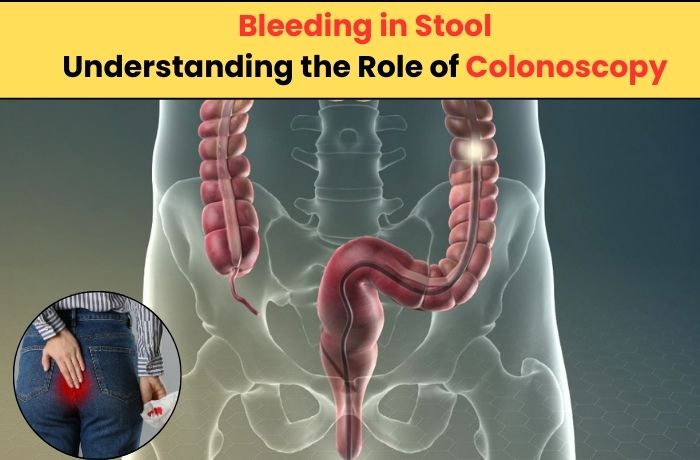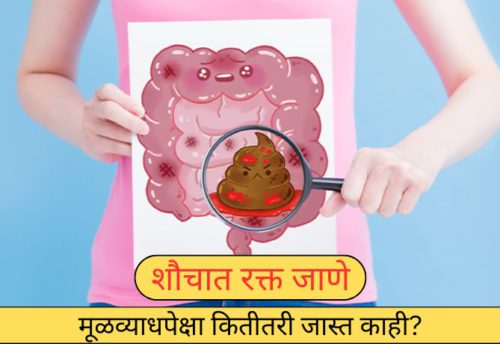
- May 10, 2024
- Dr. Suresh Jain
- 0 Comments
- 147 Views
- 0 Likes
- Colonoscopy
Bleeding in Stool: Understanding the Role of Colonoscopy
Why It Matters:
A colonoscopy is a procedure in which a thin, flexible tube with a light and camera is inserted into the rectum to examine the entire colon. It’s a valuable tool for diagnosing the cause of bleeding in the stool.
Bleeding in the stool is a troubling symptom that might signal a variety of underlying conditions, ranging from small issues like hemorrhoids to more serious ones like colon cancer. Ignoring symptoms might result in a delayed diagnosis and treatment, potentially compromising your health and quality of life. As a result, taking proactive measures to address this issue is essential. Colonoscopy is a useful method for determining the origin of bleeding in the digestive tract, particularly the colon and rectum.
Detection of Bleeding Source: Colonoscopy allows doctors to see straight into the colon and rectum. This treatment can assist in identifying the source of the bleeding, which might include ulcers, polyps, diverticula, or malignant growths.
Colonoscopy can also be used as a screening method to assess the general health of the colon, particularly in people over 50 or with a family history of colon cancer.
Biopsy and Treatment: If abnormal growths or other questionable regions are discovered during a colonoscopy, tissue samples (biopsies) may be obtained. These samples can be used to diagnose illnesses such as inflammatory bowel disease and malignancy. A colonoscopy can also be used to undertake specific treatments, like as polyp excision.
colonoscopy is frequently performed to check for recurrences or new growths.
A colononoscopy can sometimes be used as a prophylactic measure. Colorectal cancer can be prevented with a colonoscopy, which detects and removes polyps before they become cancerous.
Understanding Bleeding in the Stool
There are several reasons why you may see blood in your stool. Some common reasons include :
Hemorrhoids: These are swollen veins in the rectum or anus that may bleed, especially with straining during bowel movements.
Anal fissures: These are small tears in the lining of the anus that can cause bright red blood streaks on toilet paper.
Diverticulosis: This condition involves sacs lining the large intestine that can bleed.
Inflammatory bowel disease (IBD): This includes conditions such as ulcerative colitis and Crohn’s disease, which can cause inflammation and bleeding in the digestive tract.
When to Consider a Colonoscopy
- The color and amount of blood: Bright red blood is more likely to come from a source in the lower rectum or anus, such as hemorrhoids or anal fissures. Darker blood, maroon blood, or blood mixed with stool indicates bleeding higher up in the digestive tract and could be a sign of a more serious condition. In addition, if you’re passing a large amount of blood, this is cause for concern and warrants immediate medical attention.
- Your age and risk factors for certain conditions: Because the risk of colon cancer grows with age, anyone over 45 should be checked for it, commonly with a colonoscopy. Certain risk factors, such as a family history of colon cancer, a personal history of inflammatory bowel illness, or a genetic susceptibility to colon cancer, may increase the likelihood of a colonoscopy.
Get help from a leading colonoscopy specialist
When it comes to colonoscopy and gastrointestinal health, expertise is essential. Dr. Suresh Jain, a renowned gastroenterologist in Pune at the Digestive Endoscopy Clinic in Rasta Peth, Pune, has over 20 years of expertise in diagnosing and treating gastrointestinal diseases. Dr. Jain specializes in colonoscopy and provides patients with a full examination as well as specialized treatment.
Conclusion:
Bleeding in the stool can be concerning, but understanding the purpose of a colonoscopy allows you to make proactive efforts toward diagnosis and treatment. By committing your gastrointestinal health to skilled doctors such as Dr. Suresh Jain, you may begin on a path to optimal well-being with confidence and peace of mind. Make your health a priority and book a consultation today.


